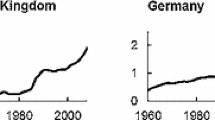Abstract
Does tax policy affect entrepreneurial choice? We use two tax reforms in Germany as “natural experiments”. These reforms reduced the marginal income tax rate for entrepreneurs with income above a certain threshold, with the exception of freelance professionals. The two conditions for belonging to the treatment group allow us to apply a “difference-in-difference-in-difference” identification strategy to estimate the effects of the tax rate reductions. We base our analysis on the microcensus, the official representative continuous household survey in Germany. The results indicate that the tax rate reductions increased the probability of choosing self-employment.
Similar content being viewed by others
References
Ai C, Norton EC (2003) Interaction terms in logit and probit models. Econ Lett 80(1): 123–129
Bach S, Corneo G, Steiner V (2005) Top incomes and top taxes in Germany. German Institute for Economic Research, DIW Discussion Paper 532
Bach S, Broer M, Fossen FM (2008) Sollen Freiberufler und Landwirte Gewerbesteuer zahlen? Steuersystematische Überlegungen und empirische Wirkungsanalysen. German Institute for Economic Research, DIW Discussion Paper 761
Blundell R, Costa Dias M (2002) Alternative approaches to evaluation in empirical microeconomics. The Institute for Fiscal Studies, cemmap working paper 10/02
Brown S, Farrel L, Sessions JG (2006) Self-employment matching—an analysis of dual earner couples and working households. Small Bus Econ 26(2): 155–172
Bruce D (1999) Do husbands matter? married women entering self-employment. Small Bus Econ 13(4): 317–329
Bruce D (2000) Effects of the United States tax system on transitions into self-employment. Labour Econ 7(5): 545–574
Bruce D (2002) Taxes and entrepreneurial endurance: evidence from the self-employed. Natl Tax J 55(1): 5–24
Cullen JB, Gordon RH (2002) Taxes and entrepreneurial activity: theory and evidence for the US. National Bureau of Economic Research, NBER Working Paper W9015
Domar ED, Musgrave RA (1944) Proportional income taxation and risk-taking. Q J Econ 58(3): 388–422
Evans DS, Leighton LS (1989) Some empirical aspects of entrepreneurship. Am Econ Rev 79(3): 519–535
Federal Constitutional Court (1977) Entscheidungen des Bundesverfassungsgerichts. Amtliche Sammlung 46:224–241
Federal Ministry of Finance (1994) Stand und voraussichtliche Entwicklung der Finanzwirtschaft im gesamtwirtschaftlichen Zusammenhang. Finanzbericht
Federal Ministry of Finance (1999) Stand und voraussichtliche Entwicklung der Finanzwirtschaft im gesamtwirtschaftlichen Zusammenhang. Finanzbericht
Feldstein M (1995) The effect of marginal tax rates on taxable income: a panel study of the 1986 tax reform act. J Polit Econ 103(3): 551–572
Gentry WM, Hubbard RG (2000) Tax policy and entrepreneurial entry. Am Econ Rev 90(2): 283–287
Georgellis Y, Wall HJ (2002) Entrepreneurship and the policy environment. The Federal Reserve Bank of St. Louis, Working Paper 2002–019B
German Bundestag (2003) Entwurf eines Gesetzes zur Reform der Gewerbesteuer. Drucksache 15/1517
Gruber J (1994) The incidence of mandated maternity benefits. Am Econ Rev 84(3): 622–641
Haan P, Steiner V (2005) Distributional effects of the German tax reform 2000—a behavioral microsimulation analysis. J Appl Soc Sci Stud 125(1): 39–49
Long JE (1982a) Income taxation and the allocation of market labor. J Labor Res 3(3): 259–276
Long JE (1982b) The income tax and self-employment. Natl Tax J 35(1): 31–42
Moore K (2004) The effects of the 1986 and 1993 tax reforms on self-employment. Board of Governors of the Federal Reserve System (US), Finance and Economics Discussion Series Working Paper 2004–05
Parker SC (1996) A time series model of self-employment under uncertainty. Economica 63(241): 459–475
Parker SC (2003) Does tax evasion affect occupational choice. Oxf Bull Econ Stat 63: 379–394
Parker SC (2005) Entrepreneurship among married couples in the United States–a simultaneous probit approach. Institute for the Study of Labor (IZA), IZA Discussion Paper 1712
Schuetze HJ (2000) Taxes, economic conditions and recent trends in male self-employment: a Canada-US comparison. Labour Econ 7(5): 507–544
Schuetze HJ, Bruce D (2004) Tax policy and entrepreneurship. Swed Econ Policy Rev 11(2): 223–265
Taylor MP (1996) Earnings, independence or unemployment: why become self-employed. Oxf Bull Econ Stat 52(2): 253–265
Author information
Authors and Affiliations
Corresponding author
Rights and permissions
About this article
Cite this article
Fossen, F.M., Steiner, V. Income taxes and entrepreneurial choice: empirical evidence from two German natural experiments. Empir Econ 36, 487–513 (2009). https://doi.org/10.1007/s00181-008-0208-z
Received:
Accepted:
Published:
Issue Date:
DOI: https://doi.org/10.1007/s00181-008-0208-z



